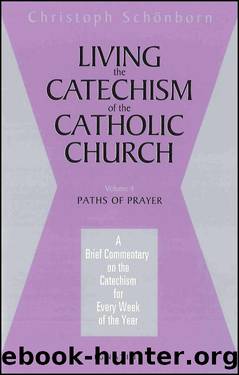Living The Catechism of The Catholic Church, Vol 4: 2 by Schoenborn Christoph Cardinal

Author:Schoenborn, Christoph Cardinal [Schoenborn, Christoph Cardinal]
Language: eng
Format: epub
Tags: Spiritual & Religion
ISBN: 9780898707274
Publisher: Ignatius Press
Published: 2011-03-31T16:00:00+00:00
27
Prayer and silence
Mother Teresa of Calcutta (d. 1997) says: âPrayer is difficult if you do not really know how you should pray. To be able to pray, we must learn to be silent. People who can pray are people who love silence.â
Peace and quiet have become a precious commodity today. Even in the mountains we are tracked down by noise from the valley or from the airplanes in the sky. The modern world is loud. Where there is a lot of noise, you do not hear well. Hearing loss occurs more and more frequently. In all that noise, conversation founders, too; it is more and more difficult for us to hear each other. So conversation is muted. Spouses, families, suffer from the loss of intimate conversation. The hectic pace of our age, the glittering television screen, the stresses of the working world, the demands of leisure activitiesâall these things make it more difficult for us to listen to each other and to find words for each other.
This falling silent, however, is not the silence of which Mother Teresa speaks. The silence out of which prayer arises comes from hearing, from attentive listening, from hearkening to the person who speaks to us. âHear, O Israelâ, begins Godâs constant call to his people (Deut 6:4). In order for us to be able to hear God, we must be silent ourselves. Many words are not necessary for prayer, but rather an attentive heart, an âunderstanding mindâ (1 Kings 3:9). âIn praying do not heap up empty phrases as the Gentiles do; for they think that they will be heard for their many words. Do not be like them, for your Father knows what you need before you ask himâ (Mt 6:7-8).
How difficult it is to bring the torrent of words to a standstill! When we become quiet externally, usually the internal uproar begins: thoughts pursue one another, everything we think we ought to be doing demands our attention, suddenly seems so urgent. Although we longed for it, silence makes us anxious the moment it stands at the door of the heart and we really have the opportunity to enter into it.
The Dominican mystic John Tauler (fifteenth century) says: âIf God is to speak, then things have to be silent. All powers must be silent and prepare a great stillness for God.â Sometimes God first has to lead us into the desert in order for us to begin to hear, in order for âthingsâ and âpowersâ to be silent. âLet goâ of yourself, of your worries, of all desires and ideas, fears and memories!
Often our worship services are not much help in attaining this interior peace and quiet, the relinquishing of ourselves for a relationship with the One who awaits us: too many words, too much âactionâ (as important as this is in the liturgy), too few pauses and moments of quiet! How important it is after Communion to remain at peace, when Christ has come to us in the Blessed Sacrament! Quiet eucharistic adoration is an aid to resting in the Lord with an attentive ear and a loving heart.
Download
This site does not store any files on its server. We only index and link to content provided by other sites. Please contact the content providers to delete copyright contents if any and email us, we'll remove relevant links or contents immediately.
What Is the Gospel? (Foreword by D. A. Carson) by Greg Gilbert(989)
Jesus in Me by Anne Graham Lotz(941)
Daily Strength: Devotions for Bible Believing Study by Douglas Stauffer & Andrew Ray & Rick Quatro(896)
Christian Ethics by Wilkens Steve;(854)
The Practice Is the Path by Tias Little(816)
New Morning Mercies by Tripp Paul David(806)
Cleaning Up Your Mental Mess by Dr. Caroline Leaf(738)
Veritas: A Harvard Professor, a Con Man and the Gospel of Jesus's Wife by Ariel Sabar(721)
Greatest Mystery in the World by Og Mandino(663)
The Creative Call by Janice Elsheimer(596)
No More Christian Nice Guy by Paul Coughlin(581)
Our Appointment with Life by Thich Nhat Hanh(571)
Monastic Archaeology by Unknown(564)
2084 by John C. Lennox(556)
This One Wild and Precious Life by Sarah Wilson(542)
Jesus--Awesome Power, Awesome Love (Discover 4 Yourself® Inductive Bible Studies for Kids) by Kay Arthur(530)
The Duties of Parents by J.C. Ryle(514)
The Catholic Verses: 95 Bible Passages That Confound Protestants by Dave Armstrong(510)
The Tale of the Tardy Oxcart (Swindoll Leadership Library) by Swindoll Charles R(492)
